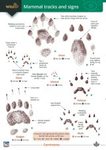Field / Identification Guide World / Checklist
By: Russell A Mittermeier(Author), Olivier M Langrand(Author), Don E Wilson(Author), Anthony B Rylands(Author), Jonah Ratsimbazafy(Author), Kim E Reuter(Author), Tiana Andriamanana(Author), Edward E Louis, Jr.(Author), Christoph Schwitzer(Author), Wes Sechrest(Author)
173 pages, colour illustrations, colour distribution maps
![Mammals of Madagascar Mammals of Madagascar]()
Click to have a closer look
About this book
Customer reviews
Related titles
About this book
The first book to describe and illustrate every mammal species found in Madagascar. Also includes those of the nearby islands of the Comoros, the Seychelles, Réunion and Mauritius.
This illustrated checklist covers Madagascar, one of the highest-priority Biodiversity Hotspots on our planet given the amazing diversity of its flora and fauna and its long list of extraordinary endemic species. Small though the island is in a global context, it is considered to be one of the world's four major regions for primates, most notably for its more than 100 endemic species of lemur. Given Madagascar's globally unique biodiversity, and the relative ease with which it can be seen and enjoyed, it should be one of the world's premier ecotourism destinations.
Although not a traditional field guide, Mammals of Madagascar will equip both residents and visitors to the region with an easy-to-use resource that will allow them to quickly learn about the 253 species of mammals known to occur in the area.
- With an easy-to-use format that is very handy for the field, this new book enables visitors to see at a glance which species are present in the region, and gives pointers that will help towards their identification.
- Covering the 253 mammal species occurring naturally in Madagascar, as well as 13 others restricted to the neighbouring islands.
- Texts for each species include common names in English and French; scientific names; conservation status according to the IUCN Red List of Threatened Species; the most relevant details about habitats occupied; and brief descriptive notes.
- Each species account is accompanied by one or more illustrations and a distribution map.
- Two separate sections deal with the land mammals of the neighbouring islands and mammals introduced to the region by humans.
- Also included is a table of selected sites for observing mammals across the region, together with a note of some of the highlight species for each site.
- Convenient checklists are provided for Madagascar and each island group, where you can mark the species you have seen.
Customer Reviews
Field / Identification Guide World / Checklist
By: Russell A Mittermeier(Author), Olivier M Langrand(Author), Don E Wilson(Author), Anthony B Rylands(Author), Jonah Ratsimbazafy(Author), Kim E Reuter(Author), Tiana Andriamanana(Author), Edward E Louis, Jr.(Author), Christoph Schwitzer(Author), Wes Sechrest(Author)
173 pages, colour illustrations, colour distribution maps


























![How to Find and Identify Mammals [Revised Edition]](http://mediacdn.nhbs.com/jackets/jackets_resizer_medium/21/210208.jpg?height=150&width=106)














